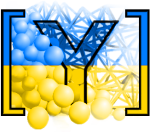Welcome to Yade - Open Source Discrete Element Method
The Yade project is a strong community based entirely on peaceful international cooperations. This diverse foundation has bound us to many brilliant scientists from Ukraine and Russia who are unjustly affected by the current hostilities perpetrated by Russia on Ukraine. We, the Yade developers and users, hope for the immediate cessation of agression followed by the prompt restoration of peace in Ukraine. We stand with the people of Ukraine, the citizens of Russia, and the thousands of Russian scientists who vehemently protest this war. As these scientists point out, this unlawful invasion puts many innocent lives at risk in both Ukraine and Russia. Without a doubt, we will continue to keep these Ukranians and Russians in our thoughts as we await a peaceful conclusion ahead.
Yade is an extensible open-source framework for discrete numerical models, focused on the Discrete Element Method. The computation parts are written in c++ using a flexible object model and allowing independent implementation of new algorithms and interfaces. Python is used for rapid and concise scene construction, simulation control, postprocessing and debugging.
Yade is located at yade-dem.org, which contains this documentation and wiki. Development is kindly hosted on launchpad and GitLab ; they are used for source code, bug tracking and source downloads and more. Building, regression tests and packages distribution are hosted on servers of the Grenoble Geomechanics group at Laboratoire 3SR, UMS Gricad and Gdańsk University of Technology.Yade supports high precision calculations (following this publication) and Python 3 (see backward compatibility for Python 2). The development branch is on GitLab.
This documentation describes Yade version 2025-12-09.git-0fef579, see changelogs. You can also download a PDF version of this documentation.
Acknowledging Yade
Please make sure you read the "Acknowledging Yade" section if you plan to use Yade for publications.
Documentation
|
Introduction Tutorial User's Manual Programmer's Manual |
DEM Formulation Class reference Yade modules Multiscale FEMxDEM |
|
References Installation Full contents |
Index Search Yade Technical Archive |
Yade Community
|
Authors and contributors Public support and Discussions Publications Screenshots and videos |
Discord server Twitter account Paid support and Consulting Yade community events |
